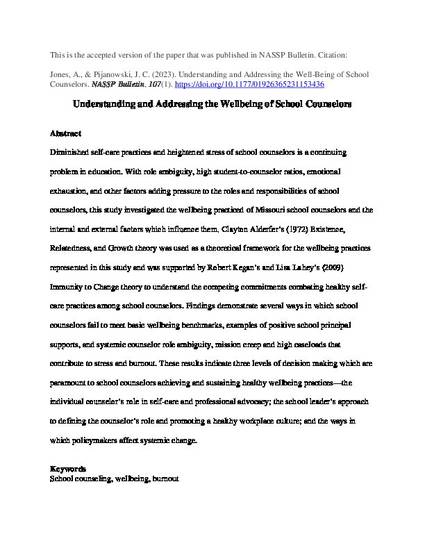
Article
Understanding and Addressing the Well-Being of School Counselors
NASSP Bulletin
(2023)
Abstract
Diminished self-care practices and heightened stress of school counselors are continuing problems in education. With role ambiguity, high student-to-counselor ratios, emotional exhaustion, and other factors adding pressure to the roles and responsibilities of school counselors, this study investigated the well-being practiced of Missouri school counselors and the internal and external factors which influence them. Findings demonstrate several ways in which school counselors fail to meet basic well-being benchmarks, examples of positive school principal supports, and systemic counselor role ambiguity, mission creep, and high caseloads that contribute to stress and burnout. These results indicate three levels of decision- making that are paramount to school counselors achieving and sustaining healthy well-being practices—the individual counselor’s role in self-care and professional advocacy; the school leader’s approach to defining the counselor’s role and promoting a healthy workplace culture; and the ways in which policymakers affect systemic change.
Keywords
- school counseling,
- well-being,
- burnout
Disciplines
Publication Date
February, 2023
DOI
10.1177/01926365231153436
Citation Information
Jones, A., & Pijanowski, J. C. (2023). Understanding and Addressing the Well-Being of School Counselors. NASSP Bulletin, 107(1). https://doi.org/10.1177/01926365231153436
Creative Commons license

This work is licensed under a Creative Commons CC_BY-NC-ND International License.
